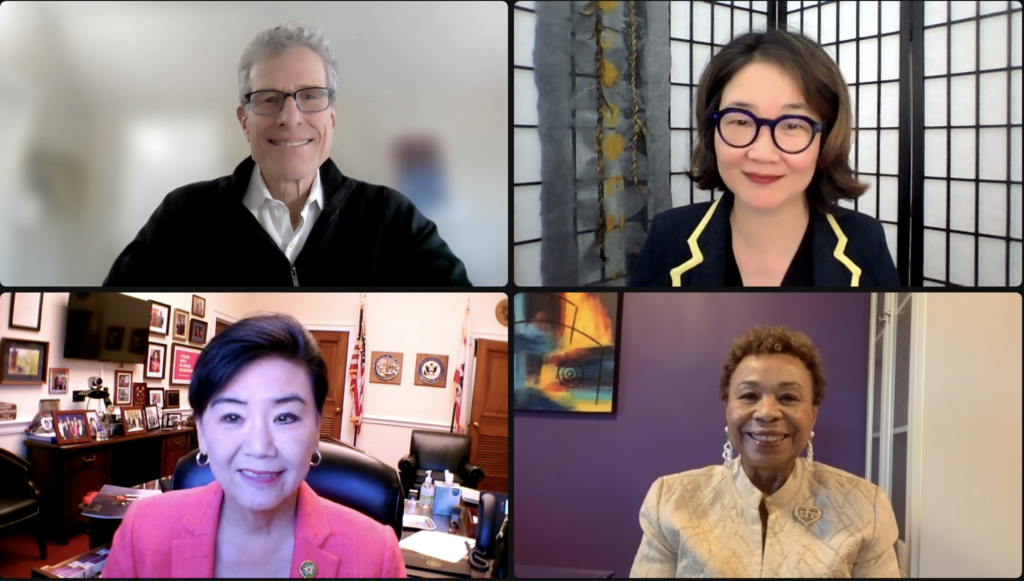
Washington, DC — Today, Congressional Asian Pacific American Caucus Chair (CAPAC) Judy Chu (CA-28) and CAPAC Healthcare Task Force Co-Chair Barbara Lee (CA-12) joined Protect Our Care and the Asian & Pacific Islander American Health Forum to discuss how the Inflation Reduction Act is benefiting Asian American, Native Hawaiian, and Pacific Islander (AA and NHPIs) communities across the nation. By lowering health care premiums and prescription drug prices, the Inflation Reduction Act is making care more affordable for AA and NHPIs, and addressing longstanding disparities in access to care and health outcomes.
Efforts to make health care more affordable and accessible are particularly important for AA and NHPIs, who have historically faced greater barriers to achieving and maintaining optimal health. The 25.2 million Asian Americans and 1.5 million Native Hawaiians and Pacific Islanders living in the U.S. have long been more likely to suffer from chronic health conditions like kidney failure, heart disease, and hypertension, and Asian American seniors are more likely than their white counterparts to report difficulty affording prescription medications. During the call, speakers will discuss how the Inflation Reduction Act is working to benefit AA and NHPIs, and other actions President Biden is taking to ensure everyone has the health care they need to thrive.
“I was so proud to work with my Democratic colleagues in Congress to pass the Inflation Reduction Act, landmark legislation to lower the costs of health care and prescription drugs and make real, tangible differences in the lives and livelihoods of people across the nation,” said U.S. Representative Judy Chu (CA-28), Congressional Asian Pacific American Caucus Chair. “With the findings from today’s report by Protect Our Care and Asian & Pacific Islander American Health Forum, we can now confirm how AANHPIs, who disproportionately suffer from certain chronic health conditions and diseases like hypertension, diabetes, and heart failure, have benefited from the law’s provisions. I look forward to future collaboration with my colleagues and outside advocates to ensure no one in America faces the prospect of going without necessary health care or prescription drugs because of exorbitant cost.”
“It’s been over a year since House Democrats successfully fought to pass the Inflation Reduction Act, and we’re starting to see the vast benefits in communities across the country—especially to our health care system,” said U.S. Representative Barbara Lee (CA-12), Congressional Asian Pacific American Caucus Healthcare Task Force Co-Chair. “Thanks to this report by Protect Our Care and APIA Health Forum, we can see just how much the IRA is lowering the health care and prescription drug costs for AANHPI families, especially those in California. I thank Chairwoman Chu for her leadership in the AANHPI community, and look forward to continuing our work together.”
“The Inflation Reduction Act includes significant provisions that alleviate barriers to health care for communities like ours,” said Juliet K. Choi, President and Chief Executive Officer of the Asian & Pacific Islander American Health Forum. “We are proud to be able to present results today that prove when we put communities’ needs first, we are stronger and healthier together. But this is just the start. With continued partnerships, from the national level to community, we can progress toward a more sustainable and equitable future.”
“The Inflation Reduction Act is a game-changer, especially for Asian American, Native Hawaiian, and Pacific Islander families,” said Leslie Dach, Chair of Protect Our Care. “Between lowering premium costs for families, and driving down drug costs for people on Medicare, the benefits of this historic legislation are already being seen across the nation. Thanks to President Biden and Democrats in Congress, not only are Asian American, Native Hawaiian, and Pacific Islander seniors and families saving thousands of dollars a year, but they are also better able to access the health care they need and deserve.”

